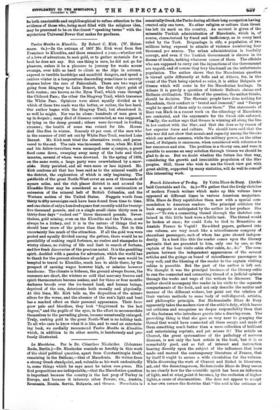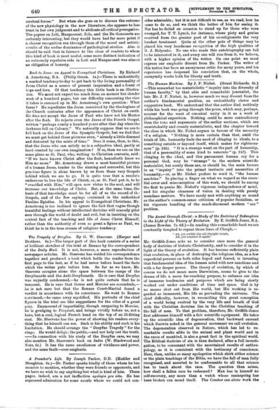French Literature of To-day. By Yetta Blaze de Bury. (Archi-
bald Constable and Co. 6s.)—We gather that the lively sketches of modern French writers which make up this volume have appeared at different times in various American magazines. Mlle. Blaze de Bury republishes them now with a special com- mendation to American readers. The principal criticism the book suggests is anticipated by the author in her preface. She says :—" To run a connecting thread through the sketches con- tained in this little book were a futile task. The thread would be broken at once ; for could Z ola be tied to Brtmetiere or Anatole France to Vogiie ? Re-edited papers, gathered into one volume, are very much like a miscellaneous company of steamboat passengers, each of whom has gone aboard indepen- dently. In a book like this the reader comes upon the literary portraits that are presented to him, only one by one, as the captain of the boat visits cabin after cabin, &c., &c." The com- parison between the independent appearances of the several articles and the goings on board of miscellaneous passengers is very well, and the likening of the reader to the captain visiting cabins is passable. But the part of the author is left out. We thought it was the principal business of the literary critic to run the connected and connecting thread of a judicial opinion through the works and ways of the writers he discusses. The author should accompany the reader in his visits to the separate compartments of the book, and not only describe the matter and manner of the different writers, but point out the relation of their various methods to some body of well-digested, artistic, and philosophic principle. But Mademoiselle Blaze de Bury apparently takes the modern view of the critic's duty, which leaves out criticism and recognises no deeper responsibility than that of the footman who introduces guests into a drawing-room. The provoking thing is that she goes so very near to grasping the thread that would have connected all these essays and made of them something much better than a mere collection of brilliant and entertaining reprints, and yet misses it ! The article on Charcot, the great systematiser of the pathology of nervous diseases, is not only the best article in the book, but it is so remarkably good, and so full of interest and instruction bearing directly upon the subject of the influences that have made and marred the contemporary literature of France, that by itself it ought to secure a wide circulation for the volume. While discerning the work of Charcot and Ilichet in literature, art, and the dissecting-room, Mademoiselle Blaze de Bury seems to see clearly how far the scientific spirit has been an influence of light, and at whatjoint it becomes, by the exclusion of higher lights, a cause of obscurantism. She does not appear to accept n her own versos the doctrine that " the soul is the outcome of
cerebral forces." But when she goes on to discuss the outcome of the new physiology in the new literature, she appears to lose trust in her own judgment and to abdicate all critical prerogative. The papers on Loti, Maupassant, Zola, and the De Goncourts are certainly interesting, but they would have had far more point if a clearer recognition ran through them of the moral and artistic results of the undue dominance of pathological studies. Also it should be said that in fairness to the class of readers to whom this kind of book is most useful, some more distinct indication of an extremely repulsive side in Loti and Maupassant was almost an obligation of honesty.























































 Previous page
Previous page